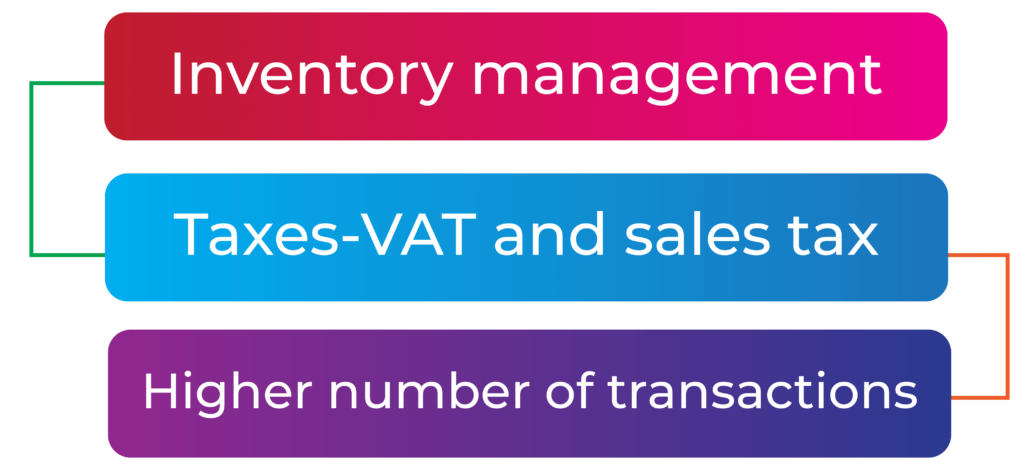Keeping track of your finances when you have just started your e-commerce business and with no prior experience in accounting is nothing less than a nightmare. However, if you split it into small parts, e-commerce accounting becomes an everyday task of your business operations.
Table of Content
E-commerce accounting in a nutshell
Are you a seller on an e-commerce platform? Do you find that keeping track of your financial flow is your chronic anxiety? If you answer yes to any of these, then continue reading.
To begin with, e-commerce accounting is difficult than typical bookkeeping.

Difficulties of e-commerce business accounting
Entrepreneurs are lured to e-commerce because of the apparent simplicity and low barrier to entry.
It appears to be simple to sell products that are currently popular on Amazon or eBay.
It’s debatable how tough it is to manage an internet shop. Online merchants and their accountants, on the other hand, agree that e-commerce accounting presents specific problems.
Let us look at some of the challenges that e-commerce accounting entrepreneurs face and how to overcome them.

Inventory management
Inventory management may be complex since you must keep track of the number of goods in production, in transit to you, in a shopper’s basket, and awaiting returns.
When your company grows, the number of product SKUs, transactions, and marketplaces will almost certainly increase. And this can make inventory management even more difficult.
Taxes- VAT and sales tax
If your UK taxable turnover exceeds £85,000, you must register for Value-Added Tax (VAT) and charge tax on your merchandise (usually 20%).
If your annual turnover is less than this amount, you are not required to register for VAT or charge VAT on your goods and services.
If you sell internationally, then take account of each marketplace you sell as each country has its VAT/ sales tax registration threshold.
A higher number of transactions
With a growing company, you’ll have more transactions and a greater number of data points. To avoid overwhelming your accounting system, you can batch your transactions daily, weekly, fortnightly, or monthly.
Accounting software, like A2X or linkmybooks, can do this for you.
Are you looking for an e-commerce accountant?
10 ways amazon sellers can stop throwing away money
Let us focus on how to avoid the top 10 costly accounting and tax mistakes Amazon sellers make.
1. When you should not be paying VAT on your reimbursements
The cash reimbursement you receive from Amazon for any item lost or damaged should be treated as non-VATable because Amazon doesn’t add VAT on this.
You can check this by going to Reports -> Fulfilment by Amazon -> Reimbursements.
2. Know about OSS VAT return for e-commerce
The EU has adopted the One-Stop-Shop for all B2C providers, which eliminates the need for a business to have numerous VAT registrations and reporting obligations in the EU as of July 2021.
B2C sellers that ship their goods from a single country will no longer be needed to register for overseas VAT or file multiple VAT returns in the countries they sell starting in July 2021.
Instead, they could complete and file a new OSS filing with their usual domestic VAT return, which would include all of their cross-border transactions.
The seller then pays the applicable VAT to their own VAT office, distributing the funds to the appropriate nations.
Non-EU vendors can also apply to utilise the OSS system, and they only need to choose one EU country to register and file in.
3. Getting reverse charge VAT wrong
You will be reverse charged VAT on your Amazon fees, excluding Amazon.co.uk Sponsored ad expenditure, if you have provided Amazon with your UK VAT number.
Amazon does not apply VAT to their fees since they invoice your UK VAT registered firm through their Luxembourg entity. Instead, they use “reverse charging VAT.”
It means that your business must account as if it were both a buyer and a seller, so you don’t have to pay VAT to them, and they don’t have to pay it to the tax authorities.
4. Not claiming VAT on amazon ad spend
Since September 2018, Amazon Online UK Limited, with a UK VAT number, is billing Amazon.co.uk for sponsored advertising.
This means that if your company is UK based, 20% VAT on expenditure will apply to any Amazon.co.uk sponsored ads invoiced after that date.
Some sellers continue to categorise their Amazon.co.uk sponsored ad charges as reverse charged VAT, which means they are not recovering the 20% VAT they are currently paying.
Other European Amazon markets are unaffected since they are still billed by Amazon Services Europe S.à r.l using a VAT number from Luxembourg. As a result, as long as you’ve submitted your VAT number in Seller Central, they’ll continue to use the VAT reverse charge mechanism.
5. Relying on the data range summary sheets
To account for their monthly sales, many Amazon sellers commit a mistake using Date Range Summary Reports and the all statements screen.
The information in Date Range Summary Reports is insufficient to ensure that you appropriately account for your Amazon sales and costs.
This is because the summary contains all revenue from several sources, which is beyond the purview of UK VAT.
When Amazon’s staff lose or damage your inventory at FBA warehouses, they refund you for the product’s ex VAT cost.
This credit is calculated by taking the average of your sales price over the last 30 days and subtracting the VAT and expected FBA and seller fees.
You are left with the net amount, which is outside the scope of VAT because it is compensation for lost or destroyed merchandise. As a result, you should not be paying VAT on this revenue.
6. Management of debtors and creditors
| Debtors or accounts receivable | Creditors or accounts payable |
| Most e-commerce businesses offer a 30 to 60 days credit period to their customers. | Most suppliers will provide you credit terms of up to 45 days. |
| This can hurt your cash flow. You can use invoice finance to improve your cash position. | Adhere to these terms to maintain a healthy relationship. |
| Try to match the credit terms you offer to your customers, and you get from your suppliers. | Suppliers value a quick and consistent payer. |
7. Not accounting for the cost of goods sold (COGS)
Because many Amazon fees are not levied on a per-sale basis, most sellers in Amazon use a profit tracker that is not a part of their accounting system to know how their sales and margins are inaccurate.
However, these profit trackers may be highly misleading.
Profit trackers are not tied to a specific order or sale and often overlook transactions like storage costs, ads through sponsorships, reimbursements, removal fees and inbound transportation.
This indicates that your margins are overstated and do not accurately reflect your actual bottom line.
8. Use automation
Tools like A2X and linkmybooks render numerous benefits to amazon sellers that include,
• Saving time
With A2X, the time-consuming job of importing transactions and doing your accounting on spreadsheets is no longer necessary. As per reports, these tools save the users up to 20 hours of manual slog each month.
• Accurate data
The data you need to make critical business choices must be correct. The reportings of these tools give you confidence that your figures are accurate, allowing you to steer your company on the proper path.
• Books that are neat and orderly
A2X organises and transmits all of your Amazon marketplace transactions to Xero, QuickBooks, or Sage in neat summaries that match your Amazon settlement payouts to the cent. There’s no need to be concerned about why your sales figures don’t match your bank deposits.
9. Spending too much time bookkeeping
Overall, the most common error we see sellers make is devoting far too much time to bookkeeping rather than growing their companies.
As you’ve probably learned, Amazon accounting is complicated than other marketplaces like eBay.
While it is critical to ensure that you correctly account for everything and not overpaying taxes, it is also vital to guarantee that you do not have to spend hours each month doing so.
Use automation wherever possible to reduce the risk of human errors.
Your e-commerce accountant can assist you in automating your Amazon bookkeeping so that you have to do it once a month for a few minutes.
10. Have a cloud accounting platform
Your entire business is online and digitised as an Amazon FBA vendor.
You won’t have to spend time bookkeeping or worrying about your numbers if you have a solid and integrated accounting system.
There are many options out there, but as an e-commerce seller, you should go with Xero or QuickBooks because they both have extensive third-party apps integrations.
Are you looking for an e-commerce accountant, if so click here Accountants Near Me | Chartered Accountants
Benefits of hiring accountants for online business
A specialised E-commerce accountant knows your business and the industry you operate in and can help you avoid common mistakes and stay on track to accomplish your goals.
E-commerce accountants are experts in the field of online business. They have a solid grasp of current market trends and are aware of the competition you will face. They understand multinational tax tactics as well and can help reduce the taxes on international transactions.
Because everything is managed online, e-commerce accountants also serve as financial counsellors and digital marketers. They do, however, understand the e-commerce market’s hype and loop. As a result, they can strategically guide you to make the best bet.
E-commerce accountants are technologically inclined professionals. They are quick to adapt to new technological developments and the latest accounting software usage as well. They genuinely made accounting accessible and pleasant for global clientele using cloud accounting.
To know more about e-commerce accountants, read our blog Why choose an e-commerce accountant over a general accountant

Bottom line
Your Amazon business will have a solid accounting basis if you adopt the ideas in this article, which will keep you safe and give you crucial, precise financial information.
You can’t go wrong if you grasp these areas of accounting for Amazon sellers and use the information in this article.











Leave a Reply